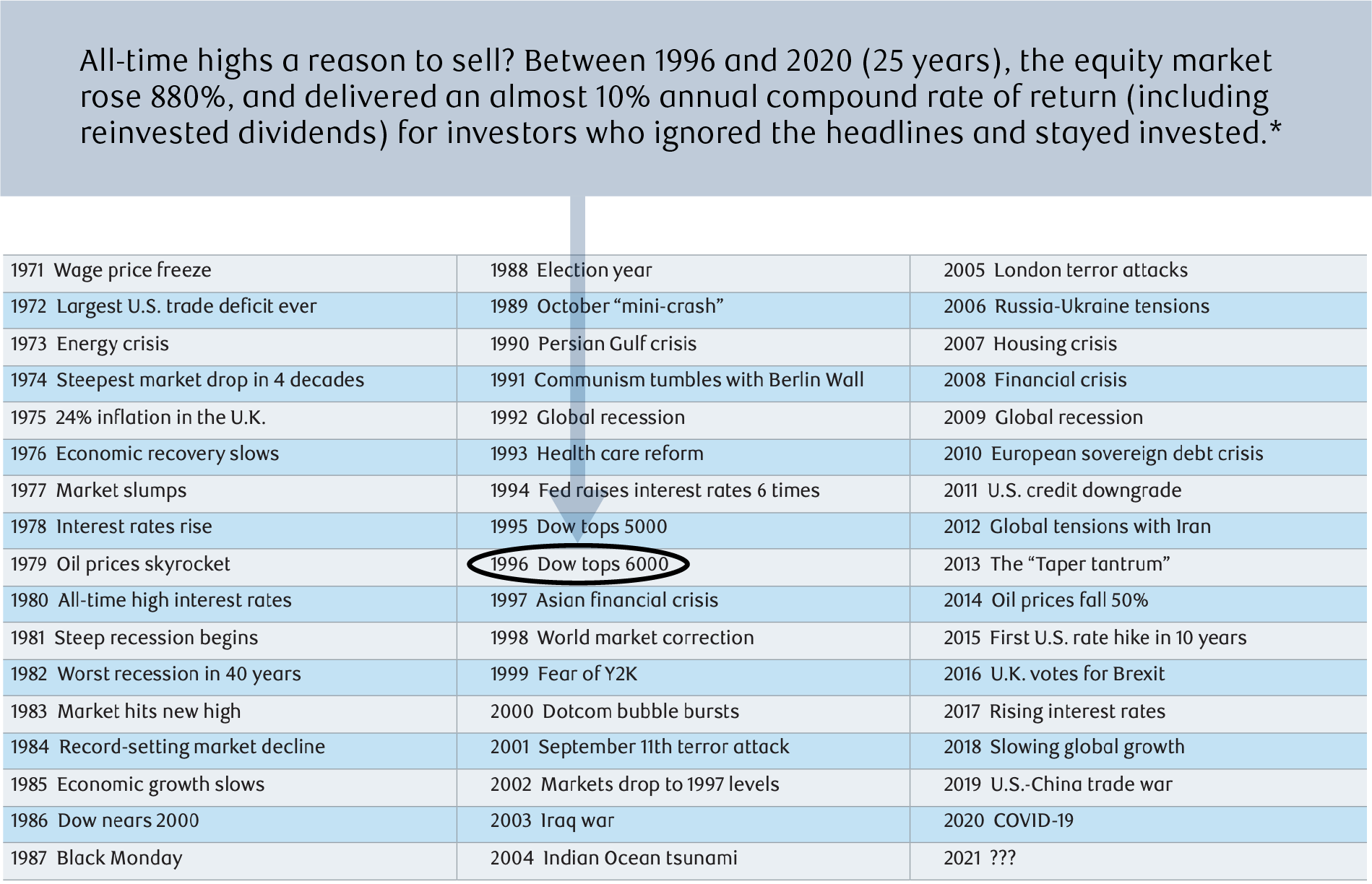New all-time highs in the markets can often tempt investors to “take the money and run.” After all, with prices so high, it must mean that the party will end soon enough. Right? Well, actually, wrong. History shows that selling at the market’s all-time high doesn’t work out over the long term. On the contrary, maintaining a disciplined approach to investing has proven over time to be the smart – and winning – strategy for long-term investors.
“Doom scrolling” – old instincts, new media
Stock markets are forward-looking entities. A rising stock is actually a reflection of a growing economy and increasing profits, and indicates a generally a positive outlook for both. The post-“COVID Crash” bull market that began at the end of March 2020 has shown us once again how equity markets are forward looking: They anticipated the economic bounce back from the government-imposed pandemic restrictions that has materialized over the last year, and is now accelerating.
On the flip side, news headlines are often structured to create fear in readers, drawing on our natural fear instinct, which has been ingrained in the human mind over tens of thousands of years. A recent term for it is “doom scrolling” – or spending an inordinate amount of time scrolling through one’s social media feed and clicking on increasingly dystopian and dark new items and stories.
Don’t believe every headline you read
Unfortunately, the combination of our ingrained protective instincts and sensational news media doesn’t help us be good investors. As we can see in the chart, there are always “good” reasons not to invest at any given time. Yet, time and time again, equity markets have continued to move higher over time.

Source: RBC Global Asset Management (2021).
Breaking new ground
With markets hitting all-time highs, it’s easy to imagine that they are expensive and about to topple. But looking at the chart, note how in 1983, 1986, 1995 and 1996, the “reason” for not investing was markets hitting all-time highs. So, if it was a good idea to sell when markets hit all-time highs and move to cash, clearly history would show that markets have fallen since and not continued to rise over time. However, note that since January 1, 1996, to the end of 2020, the S&P 500 Index has generated a return of approximately 880% including reinvested dividends, or 9.5% per year*. Apparently, hitting all-time highs proved to not be such a good reason to sell equities after all.
There are always reasons to talk ourselves out of investing. Instead, talk to us about how we can help you build a well-constructed and risk-appropriate investment portfolio that can help ensure you stay on track to your long-term goals – and focused on moving onwards and upwards to your goals.
*Bloomberg LLC. Return shown is the total return – including reinvested dividends – of the S&P 500 Index from January 1, 1996, to December 31, 2020. Note that you cannot invest directly in an index.
This information is not intended as nor does it constitute tax or legal advice. Readers should consult their own lawyer, accountant or other professional advisor when planning to implement a strategy. This information is not investment advice and should be used only in conjunction with a discussion with your RBC Dominion Securities Inc. Investment Advisor. This will ensure that your own circumstances have been considered properly and that action is taken on the latest available information. The information contained herein has been obtained from sources believed to be reliable at the time obtained but neither RBC Dominion Securities Inc. nor its employees, agents, or information suppliers can guarantee its accuracy or completeness. This report is not and under no circumstances is to be construed as an offer to sell or the solicitation of an offer to buy any securities. This report is furnished on the basis and understanding that neither RBC Dominion Securities Inc. nor its employees, agents, or information suppliers is to be under any responsibility or liability whatsoever in respect thereof. The inventories of RBC Dominion Securities Inc. may from time to time include securities mentioned herein. RBC Dominion Securities Inc.* and Royal Bank of Canada are separate corporate entities which are affiliated. *Member-Canadian Investor Protection Fund. RBC Dominion Securities Inc. is a member company of RBC Wealth Management, a business segment of Royal Bank of Canada. ® / TM Trademark(s) of Royal Bank of Canada. Used under license.
